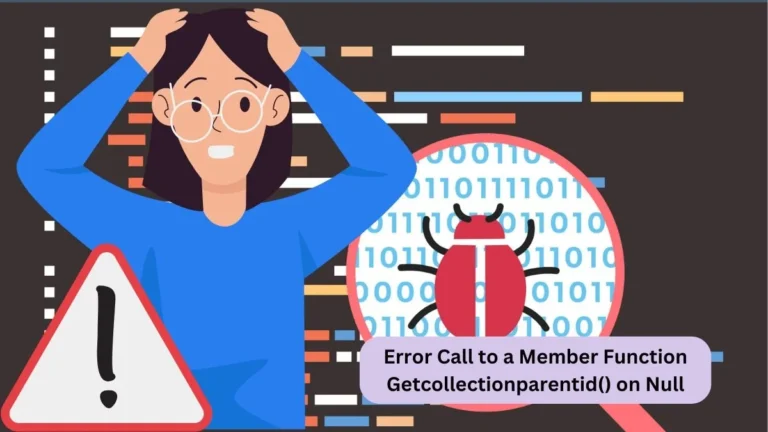What is the Error: Call to a Member Function getCollectionParentId() on Null?
The error message “call to a member function getCollectionParentId() on null” typically indicates that a script is attempting to call a method on a variable that has not been properly initialized. In this case, the method in question is getCollectionParentId(), which is expected to retrieve the parent collection ID of a given object. When this function is invoked on a null reference, it signifies that the expected object does not exist or has not been instantiated, leading to a failure in execution.
Common scenarios where this error arises include situations where an object is expected to be returned from a database query or an API call, but the object retrieval fails. For instance, if a programmer anticipates that a valid collection object will be returned but encounters an empty result due to incorrect query parameters or database issues, the subsequent call to getCollectionParentId() will trigger this error. Consequently, this not only impedes the expected functionality but also constrains the debugging process, as it presents a challenge in tracing back through the logic to determine why the object is null.
Understanding the implications of encountering this error in a codebase is critical for developers. The presence of such an error can lead to broader application malfunctions, user experience degradation, and potentially leave the application vulnerable if not addressed appropriately. To mitigate this issue, developers are encouraged to implement thorough checks that validate whether the variable in question is null prior to method calls. Moreover, careful error handling practices can help provide informative feedback to the user, as well as facilitate a more systematic troubleshooting approach, which ultimately enhances code quality and maintainability.
Common Causes of the Error
The error message “call to a member function getCollectionParentId() on null” typically arises from various programming mishaps related to object-oriented programming. Understanding the root causes of this error can provide valuable insights into prevention and debugging strategies. One common scenario leading to this error is improper variable initialization. When a variable that is expected to hold an object is never instantiated or is set to null, any attempt to invoke a method on that variable will result in the aforementioned error.
Another frequent cause relates to object scope. In many programming environments, the scope of an object can limit access to its properties or methods. If an object is defined within a certain scope and is attempted to be accessed outside of that scope, it may yield a null reference, thereby triggering the error call to a member function getCollectionParentId() on null. This type of issue is particularly prevalent in nested functions or classes where the object’s visibility may be constrained.
Additionally, improper handling of null references can lead to similar problems. It’s important for developers to anticipate potential null values and gracefully handle them, either through checks or by employing design patterns that ensure objects are available when methods are called. For instance, consider a situation where a method is expected to return an object, but due to some condition or state (such as a failed database query), it returns null instead. Consequently, any subsequent call to “getCollectionParentId()” on this null object will generate an error.
Incorporating error handling mechanisms like try-catch blocks or assertion checks can help mitigate these issues, promoting stability in applications. By understanding and addressing these common pitfalls, developers can effectively reduce the occurrence of the error call to a member function getCollectionParentId() on null in their projects.
How to Fix the Error: Call to a Member Function getCollectionParentId() on Null
When dealing with the error “call to a member function getCollectionParentId() on null,” it is crucial to adopt a systematic approach to troubleshoot and resolve the issue. The first step is to verify the instantiation of the object before invoking its methods. Ensure that the object you’re trying to work with has been properly created. In many cases, this error arises when an object is expected to exist but is found to be null.
Another important aspect is checking the existence of related objects. This can be done by confirming whether any related entities that the primary object relies on are present. By implementing checks to confirm that these related objects exist, you can preemptively guard against attempts to access methods on null objects. For instance, you can use conditional statements to verify that the objects are instantiated before invoking any member functions.
In addition, incorporating proper null value checks is essential. These checks will help ensure that your code gracefully handles situations where an expected object is not present. For example, if you’re calling the method getCollectionParentId(), it is prudent to first check if the object is not null:
This simple precaution not only helps in eliminating the immediate error but also improves the overall robustness of your application. Furthermore, consider utilizing logging to track instances when objects are null, as this will provide valuable insights during debugging and allow for targeted fixes.

By following these troubleshooting methods—verifying object instantiation, ensuring related objects exist, and implementing null checks—you can effectively resolve the “call to a member function getCollectionParentId() on null” error and prevent its recurrence in your codebase.
Preventing the Error in Future Development
In the realm of software development, encountering errors like the “call to a member function getCollectionParentId() on null” can be frustrating and time-consuming. To mitigate the risk of such errors occurring in future projects, developers should adopt several best practices. These strategies not only enhance code reliability but also foster a culture of quality and maintenance within development teams.
One effective approach is incorporating type hinting into the coding process. By specifying expected data types in function signatures, developers can reduce ambiguity in method calls and increase the likelihood that an object will be of the correct type. This proactive measure ensures that functions are used as intended, significantly lowering the chances of encountering null references that lead to errors like the aforementioned.
Another critical practice involves implementing extensive unit testing. Robust testing frameworks allow developers to create a variety of tests for their code components. Unit tests act as a safety net, catching errors before they escalate into runtime issues. By testing functions that call methods such as getCollectionParentId(), developers can ensure that these functions behave correctly under various scenarios, particularly when objects may be null. This diligence in testing serves as a preemptive strike against potential errors.
error call to a member function getcollectionparentid() on null Defensive programming techniques are also paramount in preventing null-related issues. By writing code that anticipates potential failures, developers can include checks or assertions to handle null objects gracefully. This may involve creating fallback mechanisms or returning early from functions when invalid inputs are detected. Such strategies not only enhance code clarity but also provide a layer of protection against the dreaded call to a member function getCollectionParentId() on null error.
error call to a member function getcollectionparentid() on null Incorporating these practices into the development lifecycle ultimately supports the creation of a more robust codebase. By prioritizing type hinting, thorough unit testing, and defensive programming, developers can significantly lower the likelihood of encountering similar errors in future projects.
May Be You Also Read

